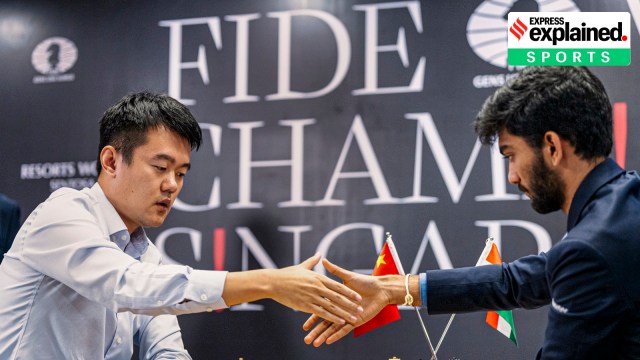Amit Kamath is Assistant Editor at The Indian Express and is based in Mumbai. ... Read More
© The Indian Express Pvt Ltd
Latest Comment
Post Comment
Read Comments
 India's Gukesh D and China's Ding Liren during the 12th game of the FIDE World Chess Championship 2024, in Singapore, Monday, Dec. 9, 2024. (FIDE/Eng Chin An via PTI Photo)
India's Gukesh D and China's Ding Liren during the 12th game of the FIDE World Chess Championship 2024, in Singapore, Monday, Dec. 9, 2024. (FIDE/Eng Chin An via PTI Photo) The fate of the 2024 World Chess Championship hangs in the balance with world champion Ding Liren and Indian challenger Gukesh tied on six points each after 12 games.
The World Chess Championship is a 14-game battle where each game is played in classical time control, which is the longest time period chess games go on for. At the World Championship, each player has 120 minutes for the first 40 moves. Once they make their 40th move, they get 30 additional minutes for the rest of the game and increments of 30 additional seconds for every move from move 41.
What happens if both players are tied after 14 games?
In case both players are tied on points after 14 games, tiebreaks (games that are played in faster time controls) will be played the next day to decide the winner.
The tiebreaks will see a four-game playoff where each player has just 15 minutes on the clock and earns an increment of 10 seconds for every move. If this does not throw up a winner, the games get faster: a two-game playoff with both players having just 10 minutes (with five seconds increment per move). If this still doesn’t provide a champion, it gets even quicker: a two-game playoff with a time control of three minutes per player (with two-second increments per move).
Who will the tiebreaks favour?
World champion Ding Liren is the hands-down favourite in the faster time controls of rapid and blitz chess.
Gukesh is a calculation-based player, who excels when he has time to think of long lines of moves. This is what has propelled him to become the youngest-ever world championship contender at the age of 18.
Gukesh has a classical rating of 2,783, and is ranked No.5 in the world in the longest time control. In contrast, Ding was World No. 23 with a rating of 2,728 in classical when the world championship started.
But the shorter the format, the lower Gukesh’s rating dips: he’s rated 2,654 in rapid and 2,615 in blitz. Meanwhile, Ding is the World No.2 in the rapid format with a rating 2,776 while his blitz rating is 2,785.
Many elite grandmasters like Hikaru Nakamura have speculated how Ding has repeatedly been playing for draws in the world championship so far, in order to drag the contest into the tiebreaks. It was in the tiebreaks that he had become the world champion last year.
“It seems that Ding has… made his intention known. If Gukesh wants to win this match, he has to take chances to break the deadlock. Ding is happy to chill his way into the rapid and blitz playoffs,” remarked chess legend Susan Polgar on X after game 10.
“If Gukesh tells Ding Liren, let’s play out draws and let’s take this into the tiebreaks, Ding Liren will accept before Gukesh can even complete the sentence,” Magnus Carlsen had said on his app Take Take Take after Game 7.
Ding is one of the rare players to have defeated Carlsen in tiebreaks (at the Sinquefield Cup in 2019).
“Gukesh has not done anything in his career to suggest that he’s very good at rapid. He’s a very confident young man. I’m sure he believes that he can win even in tiebreaks. But we’re looking at facts and there is nothing from his career to suggest that rapid is a good format for him,” Carlsen added.
What does India’s former five-time world champion Viswanathan Anand believe?
Five-time world champion Viswanathan Anand, who has mentored Gukesh, believes that Gukesh can be lethal in faster time controls as well.
Asked by The Indian Express if Gukesh was a player who was much better in classical rather than rapid and blitz, Anand said: “For me, that link isn’t that clear. He’s been more focused on classical recently because he had to be. First, he needed to qualify for the world championship. So the tournaments he played in were also classical in nature. I think his thought process in the past year has been that I have to be good in classical because that’s what the world championship is about. But you could easily imagine that someday he decides to improve on other time controls and he’ll get better there as well!”


